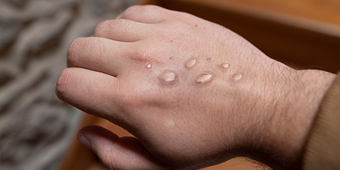The Scooters Are Coming: How To Stay Safe

Answer a few questions and we'll provide you with a list of primary care providers that best fit your needs.
Dockless electric scooters have burst on the scene in large cities across the U.S. They’re touted as a cheap form of last-mile transportation that helps reduce traffic congestion.
On the downside, they’re seen as an injury risk for riders and pedestrians. And this prompted Austin, Texas, leaders to ask the Centers for Disease Control and Prevention (CDC) to investigate scooter-related accidents.
Now Dayton is becoming the latest city to step aboard the scooter wave, at an August 21 launch celebration on Courthouse Square. Premier Health Now reached out to Michael Griesser, MD, of Premier Orthopedics, for his assessment of the scooters’ potential danger to riders and pedestrians – and how to minimize your risk.
“As a parent of four children, if my kids ever want to hop on one of these scooters, the first thing I’m going to do is make sure they’re wearing helmets the same way I would if they’re out riding their bikes,” Dr. Griesser says.
The Austin study, conducted by the CDC’s Epidemic Intelligence Service, found that less than 1 percent of the injured people were wearing helmets.
“Probably where you get into trouble is when you say the word ‘scooter,’ the implication is that it isn’t that dangerous,” says Dr. Griesser. “But the truth is, they’re just as dangerous as bikes.”
He adds, “Injuries on scooters strike me as being no different than what you incur with bicycle injuries.” Or skateboards and roller skates. And they all call for wearing protective gear, like helmets, to reduce the severity of injury.
Dr. Griesser also is concerned for the safety of pedestrians. “Scooters are coming whether we like it or not, so I think the most important part is managing the safety of these scooters by following some appropriate rules.”
He appreciates that, unlike some cities, Dayton has established regulations prior to the scooters’ arrival. This includes banning them from sidewalks and setting speed limits.
On a side note, Dr. Griesser believes the scooters’ smaller wheels increase the potential for accidents, compared to bicycles. “Because these scooters have smaller wheels, they are much more prone to catching a small pothole or bump in the road and throwing people off of them.”
Answer a few questions and we'll provide you with a list of primary care providers that best fit your needs.
Source: Michael Griesser, MD, Premier Orthopedics; CNN; Centers for Disease Control and Prevention; Dayton Daily News





